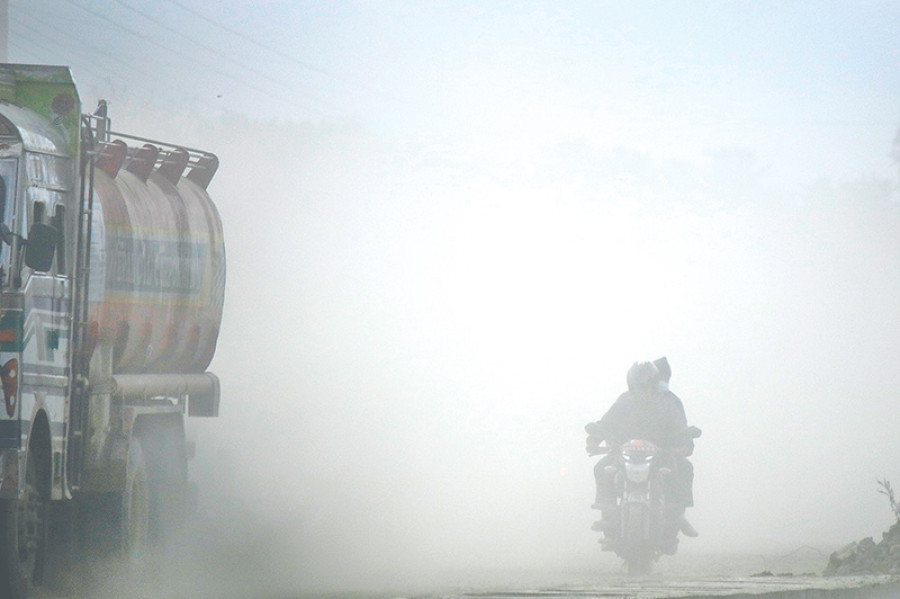National
Will imposing odd-even vehicle rule reduce pollution? Two lawyers think so.
Urban engineers say the formula may not make a lot of difference and the state needs to think of long-term solutions to air pollution.
Chandan Kumar Mandal
A writ petition has been filed at the Supreme Court asking that officials permanently enforce the odd-even formula for vehicles inside Kathmandu Valley, as a measure for dealing with the city's notorious air pollution.
Two lawyers—Rita Karki and Shyam Kumar Shrestha—filed the petition, demanding a ruling to enforce the odd-even rule for vehicles to ply the Valley roads on alternate days as per the last odd or even digit of the vehicle registration number.
“Air pollution due to vehicular emissions has become a big threat to public health in Kathmandu Valley,” Karki, one of the petitioners told the Post. “Imposing odd-even rule can be one of the options for dealing with the Valley’s poor quality air. Therefore, we have filed the petition.”
Although the petition has been registered with the intention of improving poor air quality in the city, urban transport and air pollution experts say the measure is short-sighted and won’t help in dealing with the air pollution havoc.
According to Aashish Gajurel, a traffic engineer and an expert on public transport, the move can be rather counterproductive for the city’s air and the public in general.
“If enforced permanently, it can have rather more effects which can be varied for people from different walks of life,” Gajurel told the Post. “Rich people might buy two vehicles and use them on alternate days. The step aimed at controlling vehicular emission might add up more vehicles.”
The petition demands that vehicles carrying VIPs, schoolchildren, government officials, essential items and those used for emergency works should be allowed to operate on odd-even rule periods whereas all private and public transport vehicles will need to abide by the rule.
Fewer vehicles on the road will release less amount of pollutants from vehicles, ultimately controlling air pollution, petitioners argue.
Bhushan Tuladhar, an environmentalist who closely follows urban environmental issues, says the odd-even formula can help in cutting air pollution to some extent.
“If you ask about reducing air pollution and traffic congestion, then the rule can be efficient to some extent,” said Tuladhar. “However, the rule comes with limitations. We need more comprehensive actions than only imposing odd-even method.”
The Delhi government in India had first imposed the odd-even scheme in January and April in 2016 after its air quality had drastically deteriorated. However, whether the odd-even scheme that allows odd registration numbers to ply on odd dates and those with even registration numbers on even dates, brought pollution levels down remained contested.
While some reports showed that the rule only provided a minor respite from air pollution, others said New Delhi’s rule was the only and the most stringent of its kind to curb pollution among cities choking with toxic air.
As the winter sets in, Kathmandu Valley and many bordering towns in the southern plains also struggle with poor air quality. Among multiple sources of pollutants, the transport sector remains one of the major contributors of harmful pollutants.
While keeping half of the vehicles off the road can equally halve the emission levels, it might give rise to another kind of trouble for the public—inconvenience in movement. Odd-even rule has been enforced in Kathmandu Valley in view of special events like BISTEC Summit and the recently concluded 13th South Asian Games.
“What will happen is there will be half the number of vehicles on the road and more people trying to use those vehicles, causing more inconvenience, which has happened in the past as well,” said Tuladhar.
According to Sindhu Prasad Dhungana, spokesperson for the Ministry of Forest and Environment, the idea of imposing the odd-even rule for vehicles had been proposed during discussions on air pollution control in the past.
“But it was not imposed considering the inconvenience it might cause to the public,” said Dhungana. “We also cannot tell people to use them on alternate days because they have already bought their vehicles.”
Experts urge that the government needs to think beyond the temporary odd-even schemes if it wants to get rid of poor air quality in the country.
“It should start with improving the public transport sector,” said Gajurel. “If public transport is better, people can avoid buying private vehicles and rely on public transport for their mobility.”
Promotion of electric vehicles by investing in its infrastructure, introducing EVs for public transport, and strictly enforcing green-sticker rule for vehicles are required to curb air pollution, according to experts.
“At one point, the government can introduce a policy saying every new vehicle should be an EV,” said Tuladhar. “We can also remove most pollution-emitting vehicles from roads and promote cycling and walking culture.”
Karki, the petitioner, believes while the government policies might take some time, the odd-even rule can provide quick respite from air pollution.
“Public might face difficulties, but nothing comes close to good health and a long life,” said Karki. “If they want to breathe quality air, then they can compromise comfort until things become normal.”




 16.12°C Kathmandu
16.12°C Kathmandu














